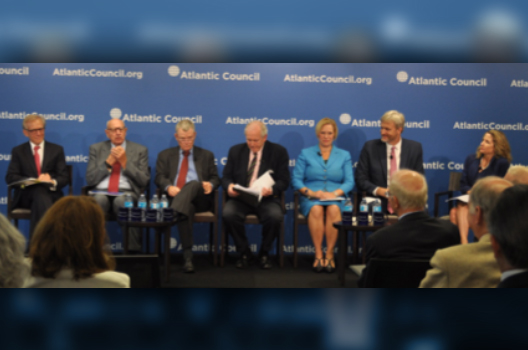Keynote Speaker
The Honorable Ed Royce
Chairman of the House Foreign Affairs Committee
A Conversation with
Amb. Thomas Pickering
Vice President
Hills and Company
Amb. Chester Crocker
James R. Schlesinger Professor of Strategic Studies
Georgetown University Walsh School of Foreign Service
Amb. David Miller
Brent Scowcroft Senior Fellow
Atlantic Council
Rand Beers
Former Deputy Assistant to the President
for Homeland Security
US National Security Council
Brad Higgins
Partner
SOSV
Jodi Herman
Vice President for Government Relations and Public Affairs
National Endowment for Democracy
Lester Munson
Vice President, International
BGR Group
Karen Hanrahan
President and CEO
Glide Foundation
Moderated by
David Ignatius
Columnist
Washington Post
In this follow-up to the Atlantic Council’s 2016 report on reforming the National Security Council, a team of respected and experienced authors led by former Ambassadors Thomas Pickering, Chester Crocker, and David Miller examined the inner workings of the US Department of State in order to find ways to improve the department’s performance quickly and for little if any cost. The report spells out five key areas where the State Department needs improvement: structure and process, personnel, budget, congressional relations, and the US Agency for International Development (USAID).
On September 6, the Brent Scowcroft Center on International Security’s Foresight, Strategy, and Risks Initiative (FSR) hosted a launch event for the State Department Reform Report. The event featured a keynote address from Rep. Ed Royce (R-CA), chairman of the House Foreign Affairs Committee, and a panel with the report’s authors moderated by Washington Post columnist David Ignatius. Chairman Royce stressed the importance of the State Department as the country’s “most important foreign policy institution,” and expressed his admiration for the department’s Foreign Service Officers (FSOs). The panel of authors then elaborated on several of their proposals, including the need for more dedicated training for FSOs, better mutual understanding between the State Department and Congress, and improvements to the independence and effectiveness of USAID.
Image: The panel of authors of the State Department Reform Report discuss possible reforms to make the State Department more effective: Moderator David Ignatius; Amb. Thomas Pickering; Rand Beers; Brad Higgins; Jodi Herman; Lester Munson; Karen Hanrahan (left to right).
